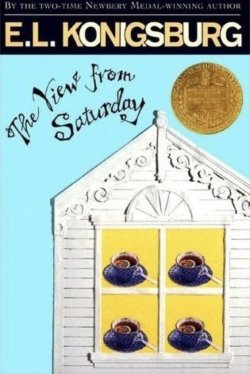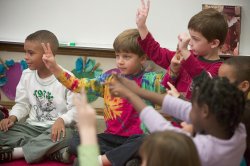Peter Shea

Review of The View from Saturday by E.L. Konigsburg (New York: Atheneum Books, 1996). Originally published in Thinking: The Journal of Philosophy for Children 19(4): 1.
E.L. Konigsburg uses every word and detail in her book, The View from Saturday to provoke the reader into thinking. She is a monstrous optimist: she just expects that the reader, like her characters, enjoys thinking, is always looking for a puzzle or a problem, a thing to think about, in every corner of the world. It’s a surprisingly successful strategy; one finds oneself trying to live up to the book’s high expectations and outrageous demands, and to the intellectual rigor that shines through on every page.
The title is the name of the book’s first and biggest puzzle. The story begins on a triumphant Saturday, and our job – we are immediately given a job, by this author – is to understand how this unexpected triumph – the victory of the sixth grade team in the regional quiz bowl – came about. Later, we understand that we have another job as well. It turns out that the quiz bowl victory is just one small dimension of the day’s triumph, and we are expected to see the full range of goodness in this very good day, to appreciate the many ways in which it completes the work and satisfies the deepest yearnings of the children and adults involved in the story: four children, their teacher, and some of the children’s family.
I suppose one might be suspicious of a book about a triumph. Lots of lives don’t have triumphs; good work doesn’t always lead to splendid results. Perhaps young adults should be prepared for that.
There are plenty of books that prepare people for sadness, for a good enough life, for getting by. It is very rare that a book– for any age person – pictures what smart people might really want, as their absolute best outcome. I can’t see how it hurts to flesh out an ideal vision, a perfect day. How can people have adequate days if they don’t know what moon to shoot for?
The moon in this book shines very brightly, indeed. This is, quite simply, a picture of gifted kids’ heaven. The school honors, cultivates and challenges intelligence. Smart kids find friends who are diverse, playful, deeply affectionate, and helpfully engaged in the problems of each other’s lives. Families pass on important concepts and skills for constructing a rich and civilized life. Gentle, persistent good humor underlies every important interaction. The central adults in the story are interesting and admirable enough to make the case to the children that growing up is worth the trouble. Every child should grow up in a world this good.
In its portrayal of an ideal of community and support, this book is both a challenge and a roadmap for teachers: here’s what has to happen, if kids are going to be encouraged to persist in being smart and interested in their world, and in developing all the parts of their minds and hearts.
One strand of Konigsburg’s narrative prefigures, is perhaps the model for, the central idea in the movie Slumdog Millionaire: in the context of a quiz bowl competition, for which generally students prepare by memorizing stray facts, the underdog sixth graders happen to get questions that call to mind rich experiences in their lives. In the strongest possible sense, they know the answers to the questions, and they know why the answers matter. As the questions are asked, Konigsburg tells the story of each contestant’s encounter with the relevant fact, showing us how that particular, normally dead, fact is alive for this child. A question about the Sargasso Sea prompts Nadia to recall her efforts to rescue sea turtles. A question about calligraphy brings back a summer Noah spent helping with arrangements for the wedding of some elderly friends. A question about the word “posh” calls forth memories of Julian’s travels with his father, a chef on a cruise ship.
This dimension of the book raises daily questions about education that will be equally alive for teachers and for alert students: what is it to know a fact? Or rather, what relationship to facts is worth having? What kind of involvement in the world makes the details and connections come alive? Noah, who answers the question about calligraphy, understands far more than the definition: he understands the mental and spiritual discipline required for fine writing, the festive occasions that require special, personal touches rather than computerized efficiencies, the dialogue of giving and receiving courtesy that makes civilized life work.
As these multiple meanings surface during the contestants’ responses to simple-minded quiz questions, any alert reader will wonder what comparable riches surround the other facts that are passed back and forth in classrooms, as the currency of education. With facts, as with any currency, it is plausible to ask what backs them. Can a currency of knowledge lose its backing, floating free of any connection to lived experience or meaning? Konigsburg raises this question adroitly, not in a negative or even a critical spirit, but as a standing test for teachers and students concerned that their education be for real.
Emerson wrote in Nature: “Go out of the house to see the moon and it is mere tinsel. It will not please as when its light shines upon your necessary journeys.” The View from Saturday is a commentary on the necessary journeys of four children and their teacher. What they encounter on those journeys pleases them greatly and makes them strong in many ways. Konigsburg challenges students and teachers to find the projects that will bring their own learning to life in this way.
